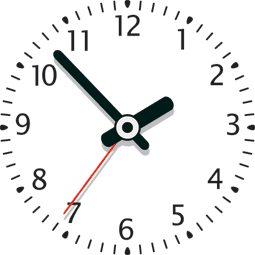Willpower? Nah, Time Management's a Habit
Published: Dec 11, 2012

Staying on task is hard, isn't it? We all make promises to ourselves for the coming year that we'll get to work earlier, stay later, achieve more, move up faster. But the minute to minute temptations of mindless web browsing, procrastination, and putting off vague, disorganized projects overcomes our willpower.
So what if we don't need willpower? Maybe they only thing holding us back is our lack of good habits.
Consider the other healthy choices you make in life: what you eat, when you go to bed, physical activities you participate in, interactions you have with family and friends.
Chances are, they're not 100% acts of willpower—they're habits you "defer" to! You get a salad because you always get a salad—it requires the least amount of thought. You go to bed because you've trained your body to get sleepy at a certain time. You go running because your friend meets you at the park at 7am unless you call and cancel, and you have dinner with your spouse every Friday night because you have an ongoing reservation at your favorite place.
If only we made good work habits a second nature, imagine how much you could get done without feeling the pain of willpower.
Here are a few simple ways to shift into smarter patterns--and a more streamlined workday:
1. Frontload your day…with easy stuff
Big vague project? Blech. Put that as your first 'to-do' and watch the next two hours wash away in murky a sea of procrastination.
Instead, come to each sleepy day prepared: have routine. A few easy "housekeeping" tasks ready to go will help you ease into your day without wasting any of it. Maybe you'll spend the first half hour of the day answering email. Or drafting a to-do list. Or browsing industry news. Whatever it is, make it a habit. Or if you know you're sharper in the mornings, keep those activities on deck for the midafternoon slump.
By simpler tasks in line for when you're at your foggiest, you'll stay productive even at your laziest--while saving your fully awake brain for the big stuff.
2. Make deadlines visible
Oh hey there Outlook Calendar. What? You can make dates look scary and looming and red? Excellent.
It's so much harder to dismiss dates when they're a visible, tangible thing, slowly coming at you. Calendar meetings, special timeslots for workflow (like 'returning phone calls hour'!), and even self-created deadlines for larger assignments—they'll make tackling work seem less optional.
For example, knowing the date for a conference you're planning might not kick up your adrenaline in time to prepare properly. But if it's on your calendar that you need to have a finalized guest list by EOD several weeks before (in bold letters, and red), you're more likely to actually get through that call list in time to work with the caterer. It's your calendar, so go nuts.
3. Make to-do lists before you go home
Sometimes, the hardest part of getting things done is knowing what to get started working on. Maybe you have a vague idea of what needs work, but it's hard to remember where you left off. Or you're not sure what to tackle first.
Step one: leave yourself notes on partly finished documents: ("Red paragraphs still need approval from XX," or "Add graphics here? Check with YY"). This way, when you open it to resume work, you won't waste time fumbling around for what you last did.
Then, email yourself a list of quick bullet point list of stuff to do the next day before leaving the office. Be sure to include tasks both big and small.
Then, when you arrive in the morning either feeling ambitions or totally foggy, you'll have something to work on. No extra thought required. (Which means less temptation to say "This is too hard," and click over to Facebook baby photos).
4. Make "piles" of info you need
Those "Remember me!" auto-fill ins you see when you online shop are there for a reason: we're more likely to follow through on a transaction when it's fast and easy.
Think of that when you're trying to get yourself to work. Is it really annoying to find that shared document? Always forgetting the passwords to intranet workbooks? If you have to go through the trouble of emailing your coworkers yet again to get log in info or the path to a document, you're much more likely to "abort."
So, make accessing your work materials a no brainer. Keep a document of login information you need for projects, all in one place. Then, save links to sites you use for research or client websites in bookmarks , so it's as easy to navigate to as that Buzzfeed article you saved for your sister in law.
Finally, create a "master" for each new project with all the links, passwords, and contact info you need in one place. Now when you're ready to start work on that project, you know exactly where to go, with no detours. And no detours means you might actually follow through.
What do you do to keep yourself on task? Tell us in the comments!
--Cathy Vandewater, Vault.com
Read More:
The Biggest Secrets To Following Through On Your Resolutions (Business Insider)
Bite Off More Than You Can Chew: A Lesson from Krispy Kreme
Normal Gets You Nowhere: Kelly Cutrone's Interview Tips
